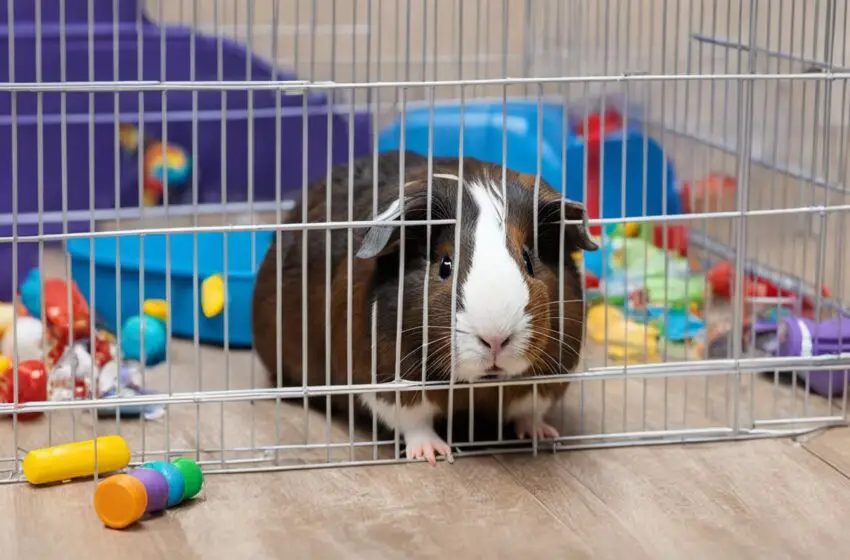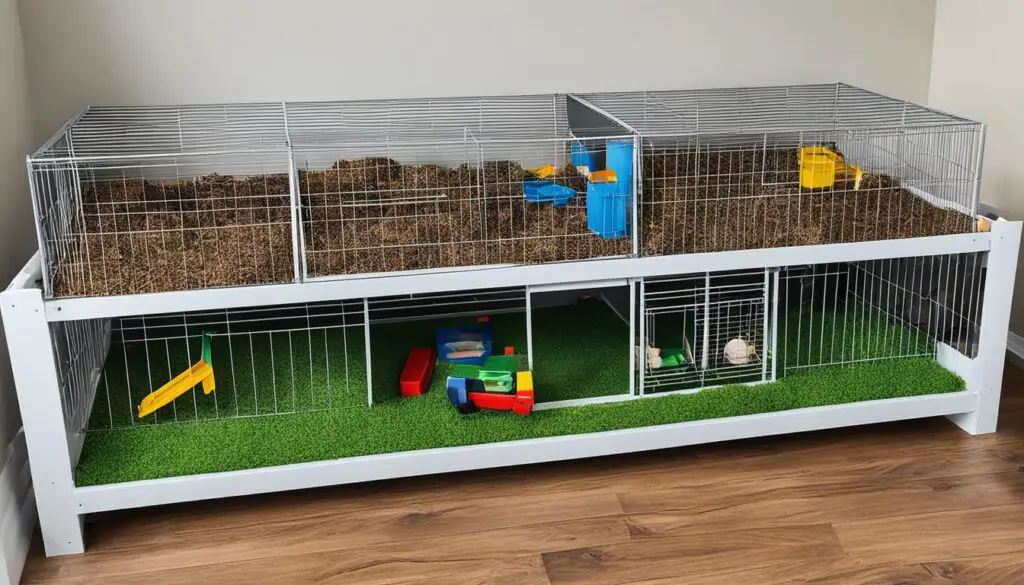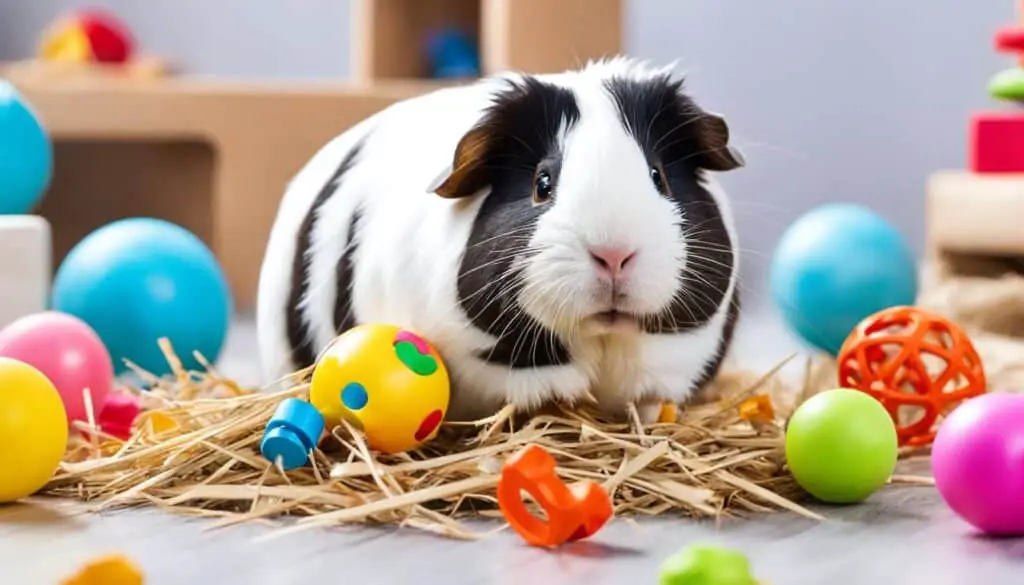Identifying and Managing Stress in Guinea Pigs

As a responsible guinea pig owner, I understand the importance of ensuring the well-being and overall health of my furry companions. Guinea pigs, like any other pets, can experience stress, which can have a negative impact on their quality of life. Therefore, it is crucial for me to be able to identify and manage the stress triggers in my guinea pigs.
By understanding what causes stress in these small pets, I can take proactive steps to provide them with a safe and comfortable environment. This includes recognizing common stress triggers and implementing strategies to alleviate their stress levels. By doing so, I can help my guinea pigs live happy and stress-free lives.
Key Takeaways:
- Identifying stress triggers is essential for the well-being of guinea pigs.
- Managing stress in guinea pigs requires creating a stress-free environment.
- Proper handling techniques and socialization can help reduce stress levels.
- Nutrition and healthcare play a crucial role in minimizing stress-related health issues.
- By paying attention to their behavior, I can provide the best care for my guinea pigs.
Common Stress Triggers in Guinea Pigs
Guinea pigs, like any other pets, can experience stress in their lives. It is important for guinea pig owners to be aware of the common stress triggers that can affect these small and sensitive animals. By recognizing these triggers, we can take steps to minimize stress and create a healthier environment for our furry friends.
Here are some of the most common stress triggers in guinea pigs:
- Loud Noises: Guinea pigs have very sensitive hearing, and loud noises can startle and stress them. This can include sudden bursts of noise or continuous loud sounds that disrupt their sense of security.
- Sudden Changes in Environment: Guinea pigs are creatures of habit and prefer stable environments. Any sudden changes, such as moving their cage to a different location or rearranging furniture near their enclosure, can cause stress.
- Inadequate Cage Space: Guinea pigs need sufficient space to move around and explore. A cramped or overcrowded cage can lead to stress and behavioral issues.
- Improper Handling: Rough or improper handling can be stressful for guinea pigs. They should always be handled gently and with care, supporting their body properly to ensure their safety and comfort.
- Lack of Socialization: Guinea pigs are social animals and thrive on companionship. Keeping guinea pigs isolated without any interaction or playmates can lead to loneliness and stress.
To ensure the well-being of guinea pigs, it is important to be able to recognize the signs of stress in them. Some common signs of stress in guinea pigs include:
- Excessive Hiding: Guinea pigs may hide more than usual when they are stressed, seeking a sense of security and solitude.
- Loss of Appetite: Stress can cause guinea pigs to lose their appetite and show a lack of interest in food.
- Teeth Grinding: Guinea pigs may grind their teeth when they are stressed or in pain.
- Hair Loss: Over time, stress can lead to hair loss in guinea pigs, particularly in patches or around their extremities.
By understanding and being aware of these common stress triggers and signs, we can provide a safe and comfortable environment for our guinea pigs, promoting their overall well-being and happiness.
Creating a Stress-Free Environment
Creating a stress-free environment for guinea pigs is crucial for their overall well-being. By providing a spacious and comfortable cage setup, we can ensure that our furry friends feel safe and secure in their living space.
Spacious and Comfortable Cage:
Guinea pigs need ample space to move around and engage in natural behaviors. A cage that is too small can lead to boredom, frustration, and ultimately, stress. It is recommended to provide at least 7.5 square feet of floor space for a single guinea pig, with additional space for each additional piggy.
Proper Bedding:
The choice of bedding material is important for creating a comfortable and stress-free living environment. Guinea pigs have sensitive respiratory systems, so it is crucial to choose a dust-free and absorbent bedding material, such as paper bedding or aspen shavings.
Toys and Hiding Spots:
Enrichment plays a vital role in reducing stress in guinea pigs. Providing a variety of toys, such as tunnels, chew toys, and puzzle feeders, can keep them mentally stimulated and alleviate boredom. Additionally, hiding spots, such as igloos or cozy fleece-lined houses, offer a sense of security and privacy.

Maintaining a Consistent Daily Routine:
Guinea pigs thrive on routine, so it is important to establish a consistent daily schedule. This includes regular feeding times, cleaning of the cage, and playtime. Predictable routines help guinea pigs feel secure and reduce anxiety caused by sudden changes.
Avoiding Sudden Changes:
Guinea pigs are sensitive creatures, and sudden changes in their environment can be highly stressful. It is important to introduce any changes gradually, such as rearranging toys or furniture in their cage, to minimize anxiety. Additionally, keeping their environment free from loud noises, excessive human traffic, and other disturbances can help create a calm and stress-free atmosphere.
Keeping the Environment Quiet and Calm:
Guinea pigs are easily startled by loud noises and sudden movements. By creating a quiet and calm environment, we can help them feel more at ease. Placing the cage in a peaceful area of the house, away from high-traffic areas and noisy appliances, can significantly reduce their stress levels.
Summary:
Creating a stress-free environment is essential for the well-being of guinea pigs. By providing a spacious and comfortable cage setup with proper bedding, toys, and hiding spots, maintaining a consistent daily routine, and avoiding sudden changes while keeping the environment quiet and calm, we can ensure that our guinea pigs live happy, healthy, and stress-free lives.
| Creating a Stress-Free Environment for Guinea Pigs |
|---|
| Provide a spacious and comfortable cage with proper bedding, toys, and hiding spots |
| Maintain a consistent daily routine and avoid sudden changes in their environment |
| Keep the environment quiet and calm by minimizing loud noises and disturbances |
Proper Handling Techniques
Proper handling techniques are essential for minimizing stress in guinea pigs and ensuring their well-being. By handling them gently and securely, pet owners can help their furry friends feel safe and comfortable in human hands. Here are some guinea pig handling tips to keep in mind:
- Support their body: When picking up a guinea pig, always support their body with both hands. Cradling them in your palms and allowing their feet to rest on your fingers will make them feel secure and prevent any accidental slips or falls.
- Avoid grabbing by legs: It is crucial to avoid grabbing or holding a guinea pig by their legs. This can cause fear, discomfort, and put unnecessary pressure on their delicate limbs.
- Avoid scruffing: While scruffing (holding them by the loose skin at the back of the neck) may be acceptable in certain situations, it should generally be avoided as it can induce stress and discomfort.
Proper handling techniques can greatly reduce stress in guinea pigs, allowing them to develop trust and confidence in their human caregivers.
Regular, gentle handling is key to acclimating guinea pigs to human interaction and minimizing stress levels. Gradually increasing the duration and frequency of handling sessions can help them become more comfortable over time.
Remember, each guinea pig is unique, and some may take longer to adjust than others. Patience, consistency, and respect for their boundaries are essential when handling these small and sensitive creatures.
Handling Tips for New Guinea Pig Owners
If you are a new guinea pig owner, it is important to take additional precautions when handling your furry companion:
- Give them time to settle: Allow your guinea pig to settle into their new environment before attempting to handle them. This will help them adjust to their surroundings and feel more at ease.
- Start with short sessions: Begin by handling your guinea pig for short periods, gradually increasing the duration as they become more comfortable. This will help prevent overwhelming them and causing unnecessary stress.
- Offer treats and positive reinforcement: Reward your guinea pig with small treats and gentle praise when they exhibit calm behavior during handling sessions. This positive reinforcement will help build trust and create positive associations with human interaction.
By following these handling techniques and guidelines, pet owners can provide their guinea pigs with a stress-free and enjoyable experience during handling sessions, ultimately fostering a strong bond between human and pet.
Socialization and Mental Stimulation
Socialization and mental stimulation are crucial for the overall well-being of guinea pigs. These social animals thrive when they have the opportunity to interact with their human caregivers and other guinea pigs. By providing ample socialization and mental stimulation, we can help reduce their stress levels and promote a healthy and happy environment for them.
One way to socialize guinea pigs is by spending quality playtime with them. This can involve gentle handling, petting, and talking to them in a soothing voice. Engaging in interactive play sessions with toys specifically designed for guinea pigs can also provide mental and physical stimulation. It’s important to ensure that the guinea pigs feel safe during these interactions, and to introduce socialization gradually to avoid overwhelming them.

“Socialization and mental stimulation are crucial for the overall well-being of guinea pigs.”
Providing a variety of toys and activities can keep guinea pigs mentally stimulated. This can include puzzle toys, tunnels, and chew toys, which not only entertain them but also help keep their teeth healthy. Adding hiding spots and platforms to their cage can provide opportunities for exploration and exercise.
Benefits of Socialization and Mental Stimulation
- Promotes overall mental and physical health
- Helps prevent boredom and destructive behavior
- Enhances the bond between guinea pigs and their caregivers
- Reduces stress and anxiety
- Encourages natural behaviors and instincts
Socialization and mental stimulation are essential components of guinea pig care. By incorporating these activities into their daily routine, we can ensure that our guinea pigs live happy, fulfilled lives.
Nutrition and Health Care
Proper nutrition and healthcare are essential for maintaining the well-being of guinea pigs and reducing stress-related health issues. By providing a balanced diet and ensuring regular veterinary check-ups, we can keep our guinea pigs healthy and happy.
When it comes to the guinea pig diet, it’s important to focus on their specific nutritional needs. A guinea pig’s diet should consist mainly of fresh hay, which provides essential fiber for proper digestion. Vegetables should also be included in their diet, as they offer important vitamins and minerals. However, it’s important to introduce new foods gradually to avoid digestive upset.
“A balanced guinea pig diet consists of fresh hay, vegetables, and limited pellets.”
Pellets should be given in limited amounts, as excessive consumption can lead to obesity and other health issues. When choosing pellets, opt for high-quality options specifically formulated for guinea pigs, and always check the expiration date to ensure freshness.
Regular veterinary check-ups are crucial for guinea pig health care. A veterinarian experienced in treating small animals can provide important preventative care, such as vaccinations and parasite control. They can also conduct thorough examinations to detect any potential health issues early on.
Grooming and maintaining good hygiene in the guinea pig’s living environment are also important aspects of their health care. Regular brushing helps to prevent matting in their fur and allows for bonding time with the pet. Additionally, keeping the cage clean and providing fresh bedding can help reduce the risk of infections and respiratory problems.
Guinea Pig Health Care Checklist:
- Provide a balanced diet with fresh hay, vegetables, and limited pellets
- Introduce new foods gradually to avoid digestive upset
- Ensure access to clean water at all times
- Schedule regular veterinary check-ups
- Keep the guinea pig’s living environment clean and hygienic
- Groom the guinea pig regularly to prevent matting and build a bond
By prioritizing proper nutrition and healthcare, we can minimize stress-related health issues in guinea pigs and provide them with a happy and fulfilling life.
| Common Stress-Related Health Issues in Guinea Pigs | Preventative Measures |
|---|---|
| Respiratory Infections | Ensure a clean living environment, free from dust and ammonia |
| Dental Problems | Provide appropriate chew toys and regular veterinary dental checks |
| Urinary Tract Infections | Offer fresh water and a balanced diet to promote proper urinary health |
| Obesity | Avoid overfeeding pellets and provide ample opportunities for exercise |
| Stress-Induced Hair Loss | Create a calm and stress-free environment for the guinea pigs |
Conclusion
Identifying and managing stress triggers in guinea pigs is essential for their well-being. By creating a stress-free environment, practicing proper handling techniques, providing socialization and mental stimulation, and ensuring their nutritional and healthcare needs are met, we can help our guinea pigs live happy and stress-free lives.
Paying attention to their behavior and needs will enable us to provide the best care for these adorable pets. It is important to be aware of common stress triggers such as loud noises, sudden changes in their environment, inadequate cage space, improper handling, and lack of socialization.
By creating a spacious and comfortable cage with proper bedding, toys, and hiding spots, as well as maintaining a consistent routine and a calm environment, we can reduce their stress levels. Additionally, handling guinea pigs gently and securely, socializing them gradually, and providing mental stimulation through playtime and toys will contribute to their overall well-being and happiness.
Finally, ensuring they have a balanced diet, regular veterinary check-ups, and good hygiene practices will help prevent stress-related health issues. By being proactive in identifying and managing stress in our guinea pigs, we can ensure they live a stress-free and fulfilling life.
FAQ
What are common stress triggers in guinea pigs?
Common stress triggers in guinea pigs can include loud noises, sudden changes in their environment, inadequate cage space, improper handling, and lack of socialization.
How can I recognize the signs of stress in guinea pigs?
Signs of stress in guinea pigs can include excessive hiding, loss of appetite, teeth grinding, and hair loss.
How can I create a stress-free environment for my guinea pig?
To create a stress-free environment for your guinea pig, provide a spacious and comfortable cage with proper bedding, toys, and hiding spots. Maintain a consistent daily routine, avoid sudden changes, and keep the environment quiet and calm.
What are the proper handling techniques for guinea pigs?
Proper handling techniques for guinea pigs include handling them gently and securely, supporting their body with both hands. Avoid grabbing them by their legs or scruffing them, as this can cause fear and stress.
How can I socialize and mentally stimulate my guinea pig?
You can socialize and mentally stimulate your guinea pig by providing ample playtime, toys, and activities. Introduce socialization gradually and supervise any interactions to ensure their safety.
What is the proper nutrition and healthcare for guinea pigs?
Proper nutrition for guinea pigs includes a balanced diet with plenty of fresh hay, vegetables, and limited amounts of pellets. Regular veterinary check-ups, proper grooming, and maintaining good hygiene in their living environment are also important for their health.



